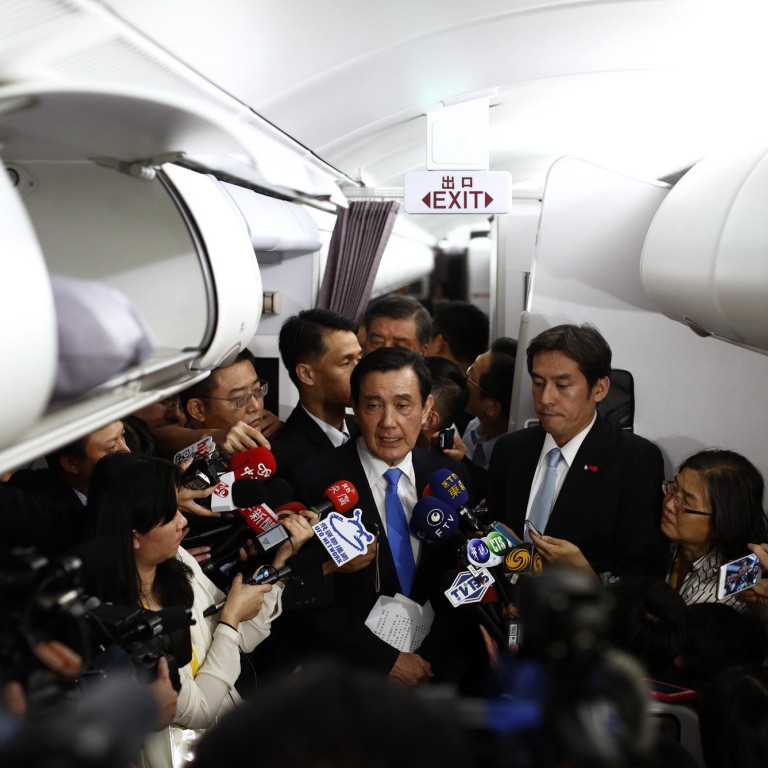
Did Ma Ying-jeou stand up for Taiwan in closed-door summit with Xi Jinping? Full transcript of Ma's remarks has the answers
Transcript of leader's remarks during meeting reveals he did convey the people's views to Beijing, but critics say he should have been firmer
Taiwan's leader Ma Ying-jeou went to lengths to persuade Beijing to remove missiles pointed at the island during his closed-door summit with President Xi Jinping on Saturday.
"I'd like to address to Mr Xi that the [Taiwanese] opposition often refers to a recent drill at Zhurihe base and the problem of missiles to criticise cross-strait ties," Ma said, according to a transcript of his remarks in the talks, released by Taiwan's Mainland Affairs Office on Monday.
"If your side could make some friendly moves, it could dismiss such unnecessary criticism."
Footage by mainland state broadcaster CCTV in July showed a drill at the People's Liberation Army's Zhurihe base featuring a complex similar to Taipei's presidential residence, fuelling talk in Taiwan about Beijing's hostility. A report on the PLA by Taiwan's Ministry of Defence in August said Beijing now had 1,500 short-range missiles deployed against the island.
Read more: Full coverage of Xi-Ma summit in Singapore
After Ma raised the missiles issue, Xi "replied that such deployments were … not directed at the Taiwanese people".
During the meeting, Ma urged Beijing to give Taiwan more international space. He also referred to "the Republic of China", a term that risked raising Beijing's ire. "One China, one Taiwan; or the independence of Taiwan, is not permitted by the constitution of the ROC," he said.
Critics had accused Ma of not highlighting the fact that both sides have different interpretations of what "one China" meant when mentioning the 1992 consensus on which cross-strait ties are based. The 1992 consensus states that both sides agree that there is only "one China", but agree to disagree on what that means. The transcript showed, however, that Ma did mention both sides had different views of what "one China" meant.
A commentary in 's overseas edition said the consensus bound future Taiwanese leaders so that no one could again behave in the way the island's two former pro-independence presidents, Lee Teng-hui and Chen Shui-bian, did.
The full transcript was released to dispel the Taiwanese opposition's doubts over Ma's meeting with Xi, analysts said, but views were split on whether the move achieved its aim.
Read more: Taiwanese opposition leader Tsai Ing-wen extends lead in post-Xi-Ma summit opinion poll
A survey by pro-independence think tank Cross-Strait Policy Association showed 48.5 per cent of those polled were not satisfied with Ma's performance at the summit, against 39.6 per cent who thought he did well.
Another poll, by the pro-Kuomintang , showed that 37.1 per cent of those surveyed were satisfied with how Ma performed during the meeting with Xi, against 33.8 per cent who were not. The KMT is presently Taiwan's ruling party.
"His attitude [on the missiles] was lukewarm. Beijing only reiterated what had been said before," said Taiwan-based analyst Wang Hsing-ching, adding that Ma should have firmly stated Taiwan's discontent over the issue.
Another political commentator, Niu Tse-hsun from Taipei's Chinese Culture University, said the goal to improve Ma's personal legacy and the KMT's chances in the upcoming presidential race had been met.
"After all, it's the first meeting of the leaders of the two sides since 1949. Ma has brought cross-strait ties to a new level," Niu said.

